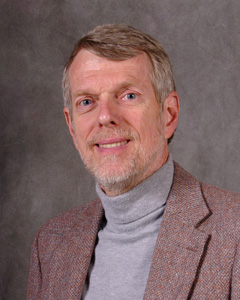
James T. Sandefur
Professor of Mathematics
Department of Mathematics
Georgetown University
37th and O St., NW
Washington, DC 20057
Office: (202) 687-6145
Fax: (202) 687-6067
email:sandefur@georgetown.edu
I received my BA from Vanderbilt University, MA from University of
Denver, and Ph.D. in Mathematics from Tulane University. My
interests are Discrete Dynamical Systems, Mathematical Modeling, and Mathematics
Education at all levels. I have written numerous articles on
modeling and dynamical
systems that are appropriate for secondary and post secondary education.
My research was in Differential Equations in
Hilbert space.
In August, 2006, I was received the MAA George Polya Award for my expository paper “A Geometric Series from Tennis” published in The College Mathematics Journal, vol. 36, no. 3, May 2005. In January, 2007, I received the Georgetown College Dean’s Award for Excellence in Teaching.
I am the author of the text
Elementary Mathematical Modeling which is appropriate for college
freshmen who have a moderate background in algebra. There is
a student solutions manual and Instructor's Resource Manual which includes all
worked out problems,. teaching suggestions, calculator instructions, and
additional problems for homework and tests. There is also an online
chapter on Chaos and Fractals. My text Discrete Dynamical Systems: Theory
and Applications is appropriate for upper level mathematics majors, but is
out of print. My text
Discrete Dynamical Modeling is appropriate
for students who have had some calculus and mathematical
maturity.
Rosalie Dance and I have developed a number of modules appropriate
for algebra students. These modules are classroom ready, have teacher
materials, and can be found at
Hands-on Activities for Algebra.
The development of these materials was supported, in part, by the National
Science Foundation. Opinions expressed in the materials are those of the authors
and not necessarily those of the Foundation. I am teaching
Introduction to Math Modeling and Strategies for Games and Puzzles,
Fall, 2006. I
received a Teaching,
Learning, and Technology Fellowship from Georgetown
University to help revise Foundations of Mathematics.
I received a
Georgetown University Sony Award for Excellence in
Science Education for development of
Introduction to Mathematical Modeling. I
was one of the writers for NCTM's
Principles and
Standards for School Mathematics, and was on the
Editorial Board for the
Mathematics Teacher as well as being co-editor
Mathematical Lens, a department in that journal. I was a program officer
at NSF in the Instructional Materials Development Program,
a Visiting Professor at the Cornell University Center for Applied Mathematics, a
Visiting Professor at the University of Iowa, and a Visiting Scholar at the Freudenthal Institute at the University of
Utrecht. I was the Principal
Investigator on a Teacher Enhancement Institute, a Teacher Leadership Grant, and
a Curriculum Development Grant.
I am a frequent consultant, including
being a consultant for the Annenberg/Corporation
for Public Broadcasting Project, the television show, It's Academic,
Cerebellum Corporation for development of 2 videotapes and accompanying books on
calculus. I have been on the
Advisory Board of the Exploratorium's Math Explorer Project as well as numerous
other NSF funded grants.
I
promoted academic integrity through my activities as
Faculty Chair of the Georgetown University
Honor Council.
After many years of teaching the course, Foundations of Mathematics,
I began to research how students learn
to construct proofs and solve problems through the use
of Video Think Alouds, which allow me to see how
students approach problem solving. For videos of students solving problems, see onto, one-to-one, induction or Terry and Greg
I have also developed a series of Power Point math lessons, using
only algebra, that help in the understanding of several
aspects of population genetics.
Additionally, I have a number of
spreadsheets that can
be used when learning dynamic modeling, that is,
modeling using difference equations. |